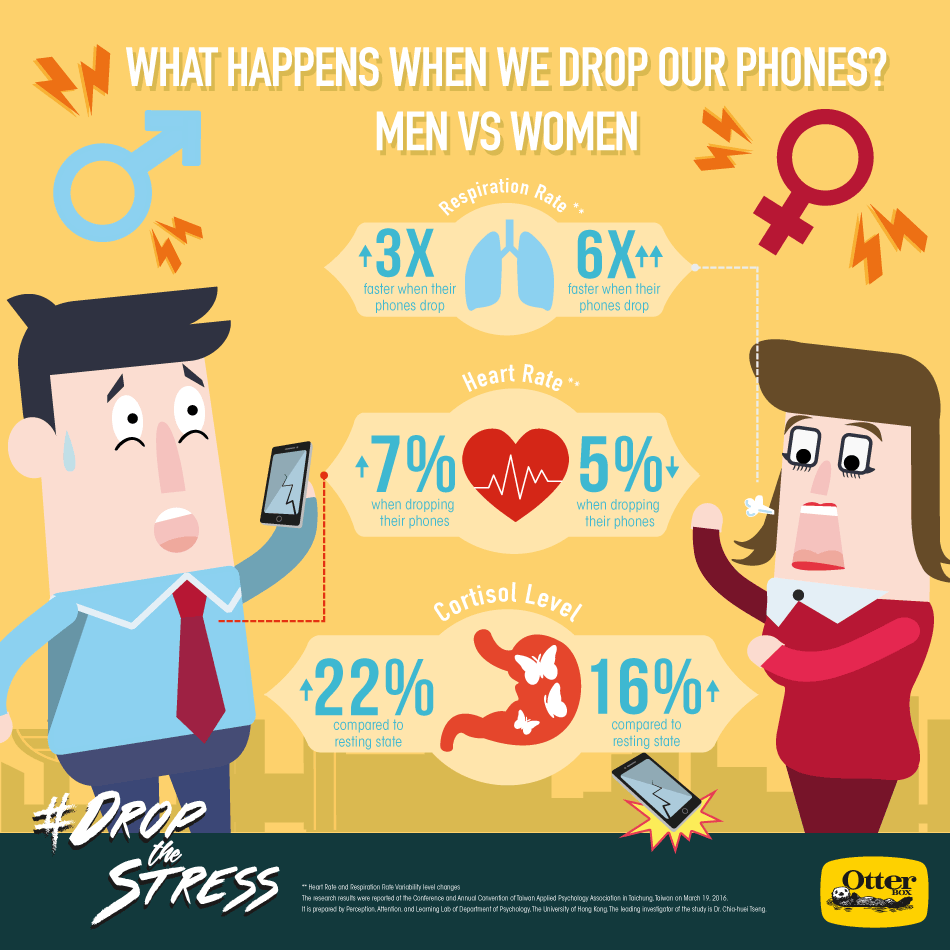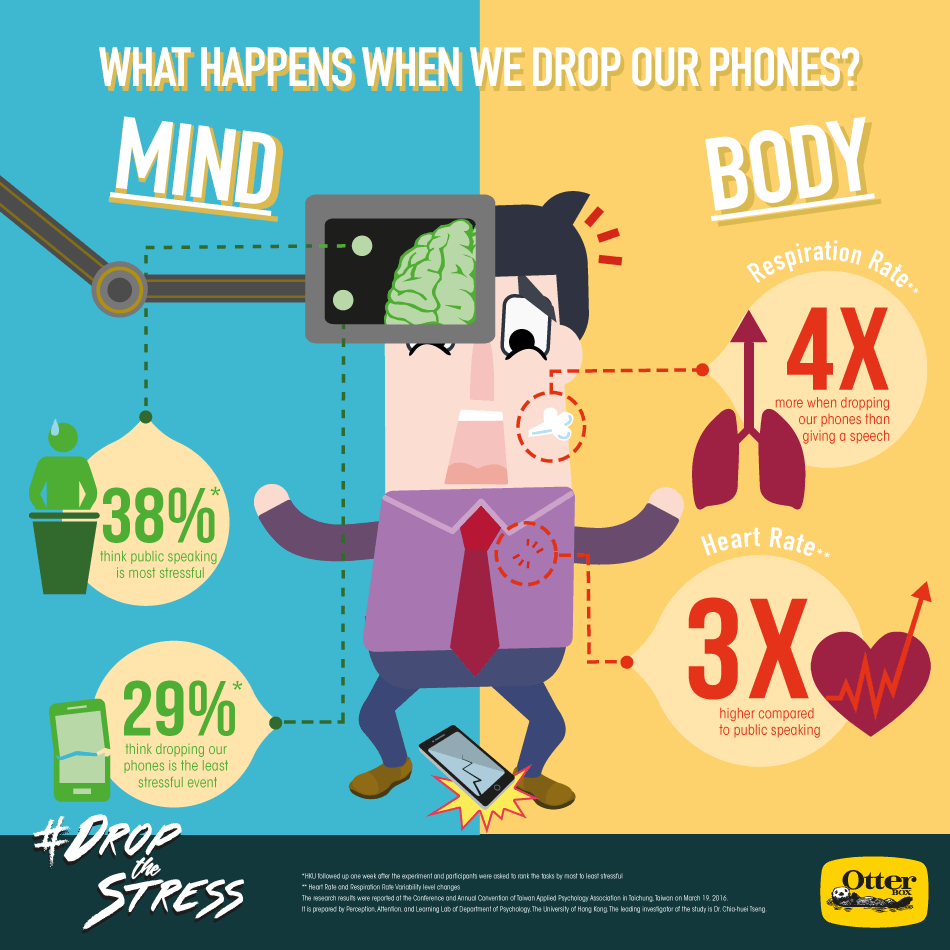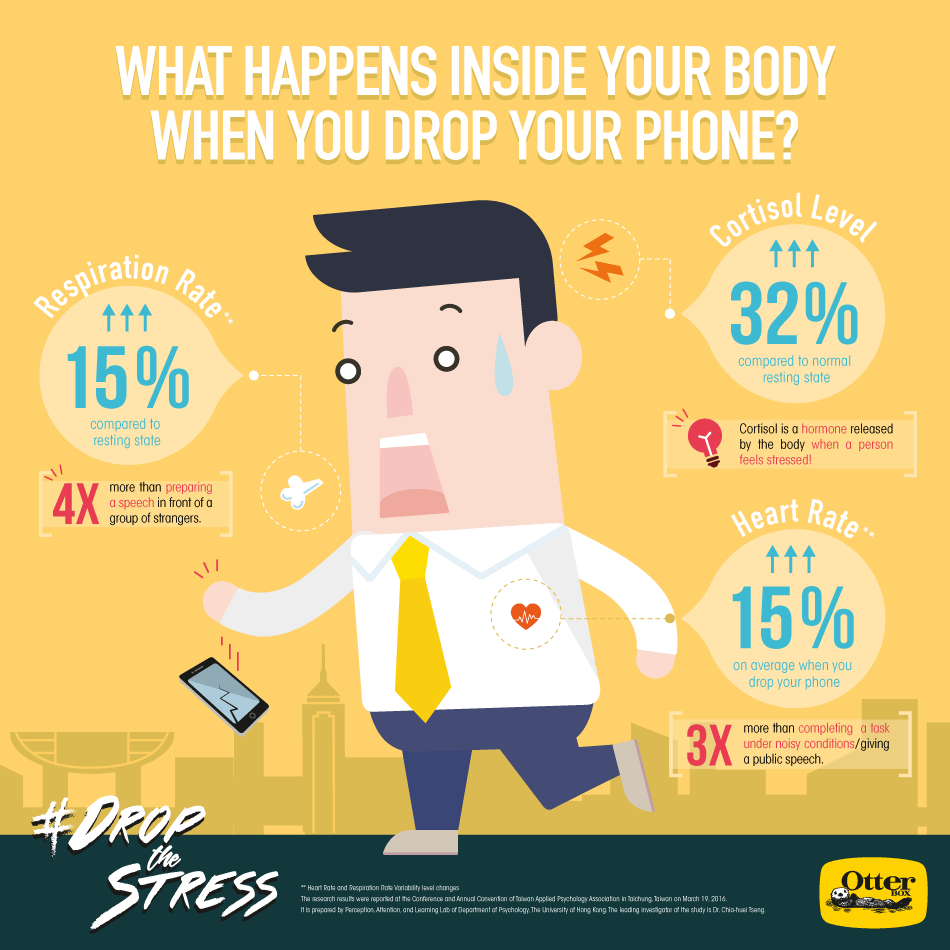New academic report proves physical effects of dropping a smartphone
- The fear of losing your device officially more stressful than making a public speech, says report
- Body releases 32% more of the stress hormone cortisol when a person drops their phone
Malaysia, 3 May 2016 — When you drop your smartphone, the screen might not be the only thing that shows cracks. For the first time, a Hong Kong academic study shows that the fear of losing or breaking your smartphone creates an actual stress response inside the human body that is stronger than the fear of public speaking. The study, conducted in collaboration with leading device protector OtterBox, aimed to uncover how emotionally attached we’ve become to our devices in Asia.
 Conducted by a research team led by Dr. Chia-huei Tseng, an assistant professor at the Department of Psychology at Hong Kong University, ‘The 21st Century Scale of Stress Report’ reveals that a person’s heart rate increases by an average of 15 percent (an increase of 7.45 beats per minute) when their phone is dropped – three times the amount that it increases when giving a public speech. A person’s cortisol level – the hormone released by the body when under stress – increases an average of 32 percent beyond the normal rate (from 8.19 to 10.82 ng/ml) when a person sees their phone crash to the floor.
Conducted by a research team led by Dr. Chia-huei Tseng, an assistant professor at the Department of Psychology at Hong Kong University, ‘The 21st Century Scale of Stress Report’ reveals that a person’s heart rate increases by an average of 15 percent (an increase of 7.45 beats per minute) when their phone is dropped – three times the amount that it increases when giving a public speech. A person’s cortisol level – the hormone released by the body when under stress – increases an average of 32 percent beyond the normal rate (from 8.19 to 10.82 ng/ml) when a person sees their phone crash to the floor.
 Dr. Chia-huei Tseng, honorary Assistant Professor, Department of Psychology, The University of Hong Kong: “During the experiment, we had our assistants appear to accidentally drop what the subjects thought was their phone and measured their physiological reactions. Out of all the tests, dropping your smartphone came out as most stressful and produced the most drastic physiological changes in all the measures.”
Dr. Chia-huei Tseng, honorary Assistant Professor, Department of Psychology, The University of Hong Kong: “During the experiment, we had our assistants appear to accidentally drop what the subjects thought was their phone and measured their physiological reactions. Out of all the tests, dropping your smartphone came out as most stressful and produced the most drastic physiological changes in all the measures.”
 Bonnie Soon, General Manager of OtterBox Asia Pacific says: “We all know that feeling, when your smartphone flies from your grip and you watch in horror as it falls to the floor. The moments before assessing the damage can feel like a lifetime. The tension and ‘stress’ we feel shows just how emotionally attached we’ve become to these devices.”
Bonnie Soon, General Manager of OtterBox Asia Pacific says: “We all know that feeling, when your smartphone flies from your grip and you watch in horror as it falls to the floor. The moments before assessing the damage can feel like a lifetime. The tension and ‘stress’ we feel shows just how emotionally attached we’ve become to these devices.”
What happens to the human body when a smartphone drops – the main findings
Researchers studied subjects, measuring a number of bodily stress responses such as heart rate, respiration rate, finger pulse and cortisol concentration levels. The live experiments compared the effects of a smartphone dropping to three other everyday stressful events – being exposed to sudden loud noises, completing a task under a strict deadline and public speaking. Dropping a device proved to be the most stressful event.
- The heart skips more than just a beat
If a person has a sudden increase in heart rate, it can mean he/she is heavily stressed, excited, or anxious. When the subjects saw their smartphone being dropped, heart rate variability increased by 15 percent on average – about 7.45 beats per minute – three times more than other stressors1. This increase rate is three times more than when they were asked to perform tasks under a short deadline, or to give a public speech. (1.7 beats per minutes).
- The body releases the stress hormone
Cortisol is a stress hormone that the body releases when a person feels stressed or in danger. When a subject’s smartphone fell to the floor, the cortisol concentration level increased an average of 32 percent (from 8.19 to 10.82 ng/ml) from a normal state.
- Taking a deep breath
An increase in respiratory intake is a sign that a person needs more oxygen to handle stressful or dangerous situations. When subjects saw their phone dropped on the floor, their respiration rate increased by over 15 percent compared to a resting state. This is four times more than when asked to give a speech in front of a group of strangers.
Dr. Chia-huei Tseng, continues: “We were really surprised by the results of the study. Public-speaking is commonly thought of as one of the most stress-inducing everyday situations in the world of psychology, but half of our subjects salivary levels increased 15% more when they saw their phone being dropped, than when asked to give a public speech.2”
Women might have a smaller heart physically, but they are the more fearless gender when reacting to modern stresses. The study reveals that male participants experienced bigger stress in all four tasks than female participants.
Men’s cortisol level increased by 22% when their phone was dropped, while women’s changed just 16%. Women, however, did find dropping their phones twice as stressful as public speaking. When measuring respiration rate, men breathe three times as quickly when they drop their phones compared to when they were asked to deliver a speech.
Life after a broken phone
A report commissioned by OtterBox in 20153 revealed just how attached we’ve become to our devices, perhaps showing why we experience such high levels of stress around the mobile world. It reports that 75% of Malaysian smartphone users have damaged their smartphones over 2.8 times in the past 5 years and 20% of them did not have any form of protection such as protective case or screen protector on their smartphones when damage occurred.
When we do break a phone, 76 percent of people say that personal data loss or changing information (e.g. bank accounts) are the most irritating things to deal with. About 72 percent of smartphone users say that not being able to remember important phone numbers is the most frustrating aspect of breaking a smartphone.
“In this mobile-everything world, we have to take precautions to drop this everyday stress by giving protection to our mobile devices to keep our data, photos and memories safe.” Bonnie adds.
For more interesting insights on this study, please refer to our infographic below:
http://www.otterbox.asia/research/dropthestress.aspx


